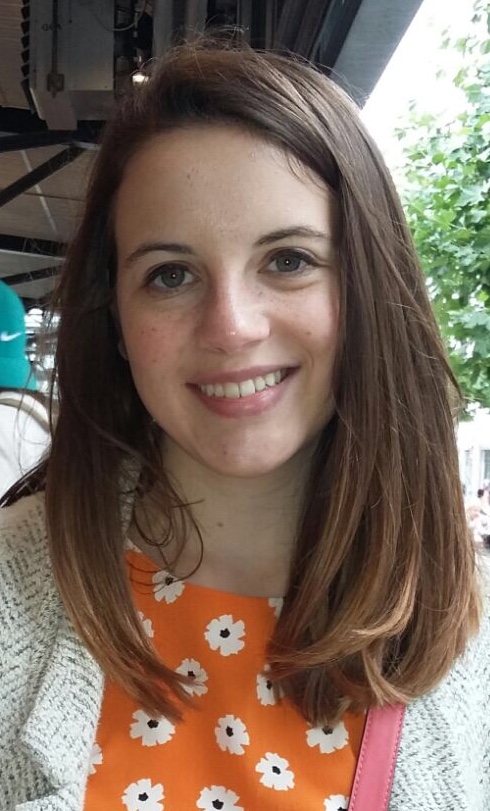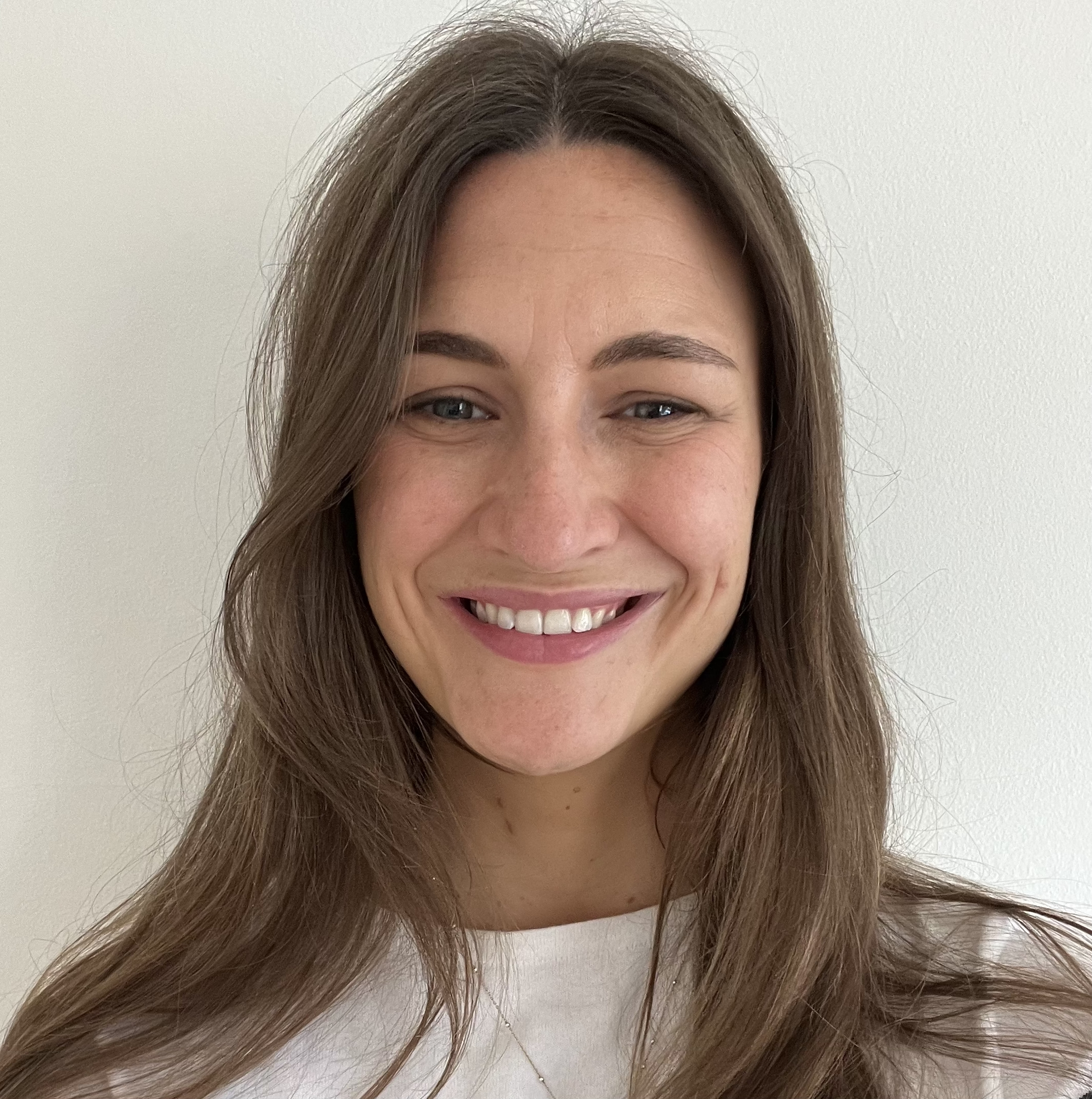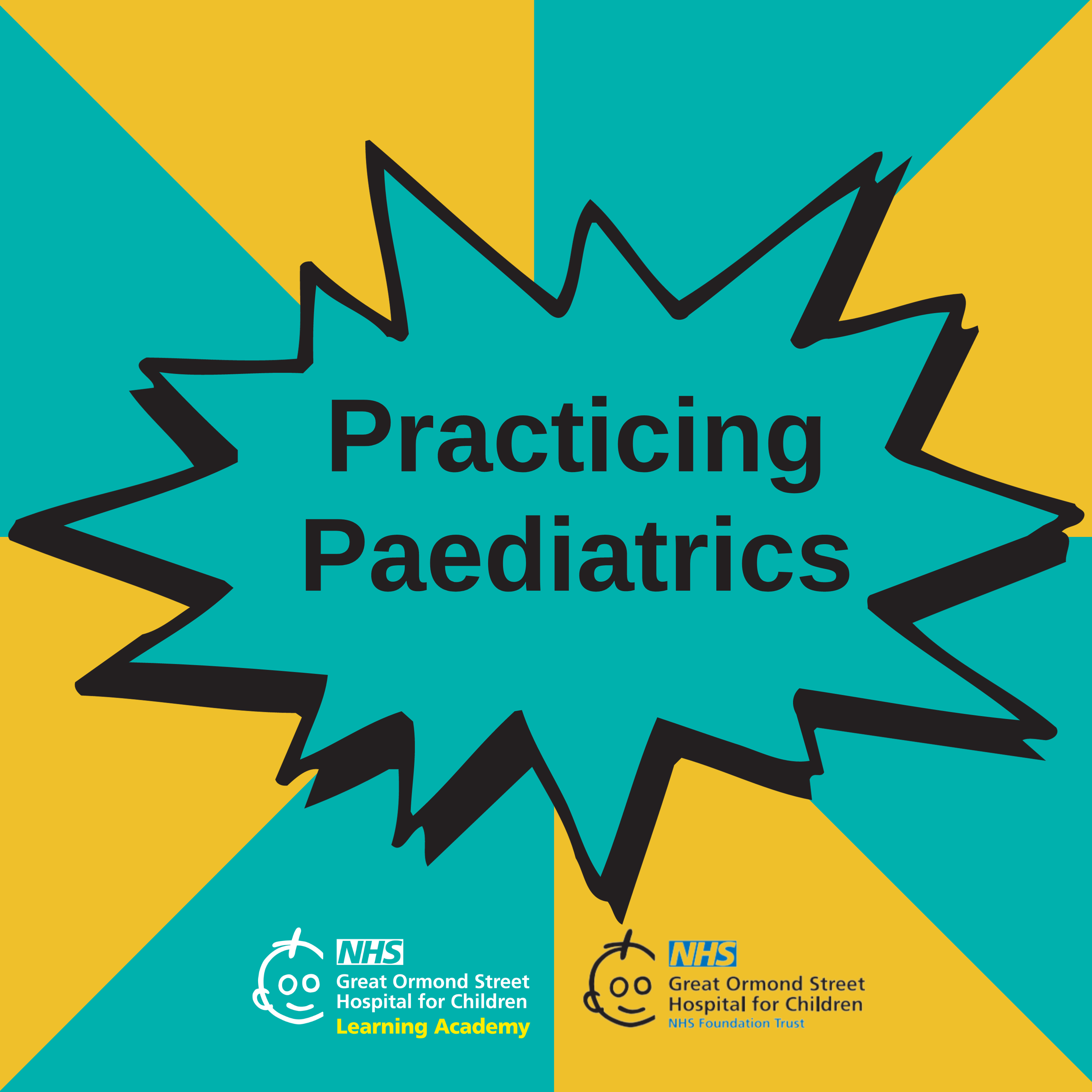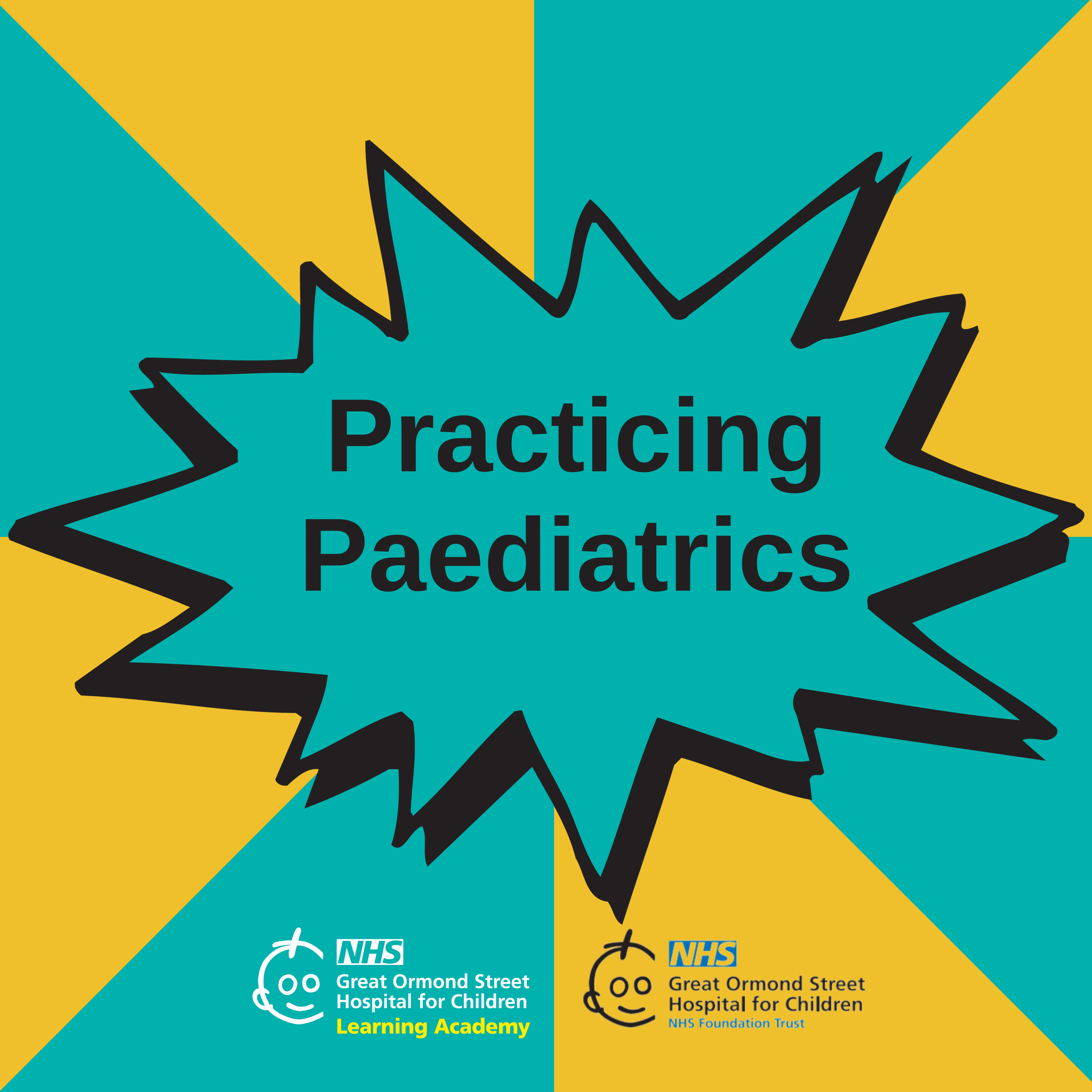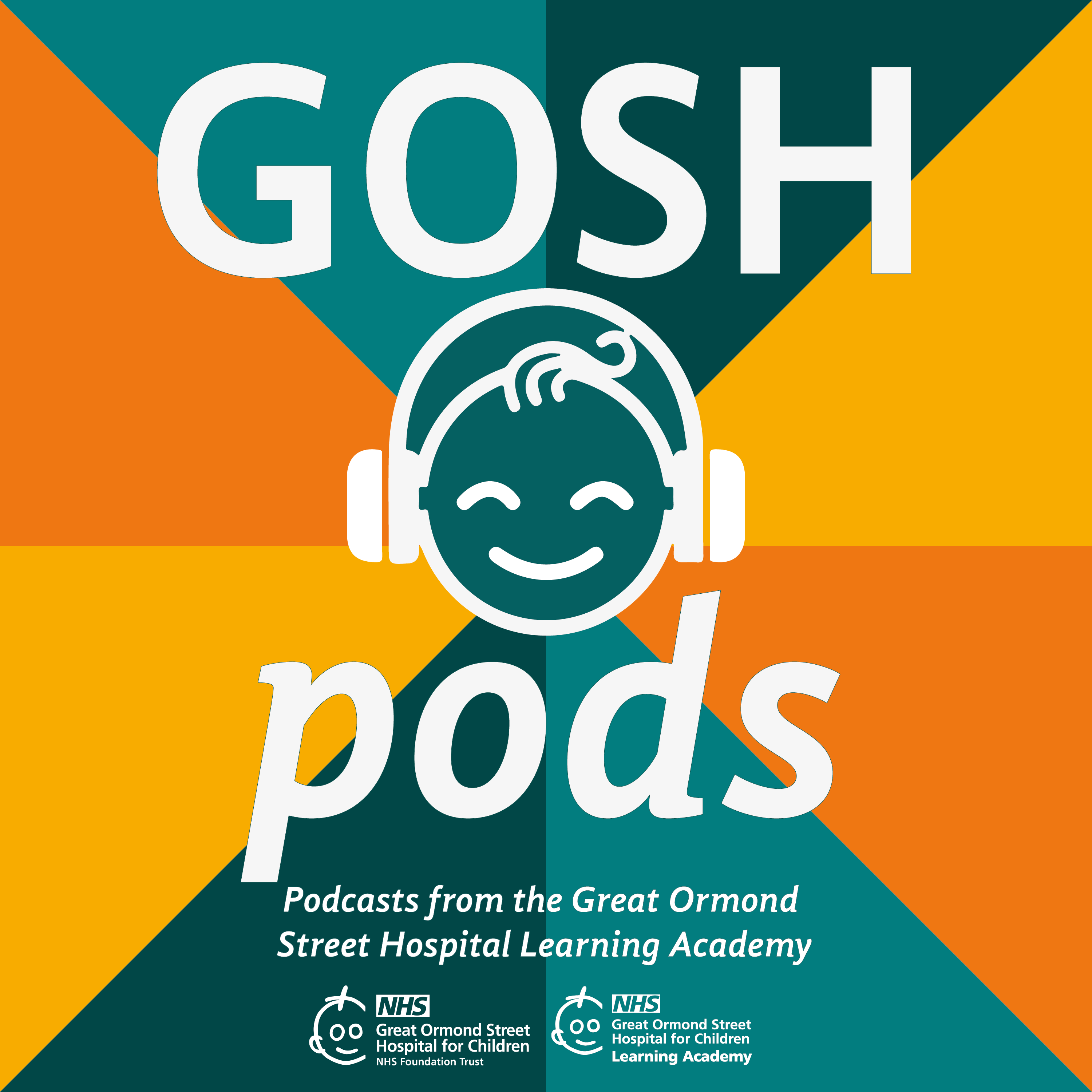Episode Transcript
This podcast is brought to you by the GOSH Learning Academy.
SA: Hello and welcome to Practicing Paediatrics. Thanks. In this series, we'll be showcasing the specialist work of the clinical staff here at Great Ormond Street Hospital. There are over 60 different clinical specialties at GOSH, providing tertiary and quaternary level care for many rare conditions. So if you are hoping to learn a little bit more about a unique condition or intervention, or just find out more about the advances at GOSH, this may be the series for you.
I'm Dr. Sarah Ahmed, a paediatric registrar and the current digital learning education fellow here at Great Ormond Street.
In today's episode, we'll be speaking with Dr. James Davison, a friend of the show, and a consultant in paediatric metabolic medicine here at GOSH. We're going to be talking about Pompe disease. We're going to talk about the aetiology, presentation, investigation, diagnosis, and management
James, thank you so much for coming back on the show today.
JD: No, It's good to be here. Thank you.
SA: So I wanted to start the way we start all these podcasts by asking you, what would you like people to get out of listening to this podcast?
JD: I think the focus for this podcast is around Pompe disease. And this is a rare disorder. But I think it would be really good that any paediatrician is aware of this condition because it's a treatable disorder that we want to be making the diagnosis of and not missing it. So I think that's the key thing to have that in our differential diagnosis.
SA: Like you said, it is quite a rare disorder, but hopefully this can give people a really nice overview of it. So let's start right at the very beginning – Pompe disease, what is it? Do you have a definition and where does that name come from as well?
JD: Yeah, so it's an interesting history where it comes from, and actually that helps us understand what the condition is all about. So, Pompe disease is named after Dr. Joannes Pompe, who was the first person who described it. He, in the early 1900s, identified an infant who died of suspected pneumonia, but at post mortem he discovered that they had a massive heart. So they had a hypertrophic cardiomyopathy. And when they did the pathology of the heart, he noted that there was loads of glycogen in the cardiac muscle cells. And that was really the first clue, the first description of this disorder. It's a glycogen storage disorder because you get an overaccumulation of
glycogen in muscle cells, which impairs the function. So, that was really the first description of the disorder. Now we know a lot more about it. So it's a glycogen storage disorder, and it's also under the category of the lysosomal storage disorders. And we'll perhaps talk a bit about that as we, as we go through.
SA: Yeah, let's let's talk a little bit about the pathophysiology. What causes Pompe disease?
JD: So, as we've said the problem that emerges is that you get a buildup or a storage of glycogen, particularly in the muscle cells. So within muscles, you need glycogen as a storage form of glucose that's there really to provide, an immediate source of fuel for muscles when they're contracting, and needing energy. You have a housekeeping system within the muscle cells though to make sure that you don't get too much glycogen building up. And that housekeeping system is the lysosome, which is a bit like the waste recycling centre in the cells. And inside the lysosome, there are several different enzymes that have different functions, but which break down large macromolecules. And there's one enzyme in particular in the lysosome, and the function of that is to break down excessive glycogen. And Pompe disease occurs when that enzyme, the alpha glucosidase, is not working. And so you get a buildup of glycogen, first in the lysosome, and then it spills over into the cytosol and causes progressive damage to the muscle cells.
So Pompe disease is caused because you're missing that specific alpha glucosidase enzyme in the lysosome. And that leads onto the storage of glycogen and that causes the problems. And so, yeah, so that it's classified both as a glycogen storage disorder because you've got glycogen building up, but also it is one of the lysosomal storage disorders because it's that, that enzyme that's missing specifically in the lysosome.
SA: and can it affect any muscle?
JD: So yes, we see in and there are different forms of Pompe disease. But the disorder it can present an effect cardiac muscle, particularly in the infantile severe form of the disorder, but it also affects the skeletal muscles. So the musculature of the arms and the legs. It will also have an impact on respiratory muscles. So diaphragm and the intercostal muscles, as well as having an impact on swallow function as well. So cardiac muscle, skeletal muscle in various places and also smooth muscle can be affected, and so for some of the patients, we, we're seeing that there are also some bladder and bowel issues that can be emerging because smooth muscle is affected and also the muscles within the small blood vessels as well. So there are lots of different areas where it can have an impact.
SA: Before we go on and talk about how it presents, I know we've already started mentioning it, but I just wanted to ask about how it's inherited. Am I right in thinking it's a genetic disorder?
JD: That's correct. So the, the enzyme that we've said is missing in the disorder that's encoded by a specific gene, the GAA gene. As with most of the metabolic disorders it's inherited in an autosomal recessive fashion. So both copies of the GAA gene have to be affected. So it's a, an autosomal recessive disorder, yeah.
SA: And so, and you've already mentioned this, but I'm guessing because it's autosomal recessive, it's quite rare as a condition?
JD: Yeah, it is, it's rare. The epidemiology is a little bit hard to give an absolute figure on. But we think for the severe infantile form, the incidence is about 1 in 100, 000. Some of the later onset forms are more common, maybe 1 in 50, 000. But yes, it is, by any account, a rare disorder.
SA: Yeah, absolutely. So thinking a little bit about those different types, how does it present? And is there like a certain age range of children that it affects?
JD: Yeah, so there are, as we've said, there's a spectrum of severity which relates to how, how much enzyme, or if you've got any of that enzyme that is still functioning. So if you've got zero enzymes, so there's no function at all, that's going to lead to the more rapid accumulation of glycogen, and so that will present at a much earlier age. So that group are the ones the children who will have the infantile onset Pompe disease. They will usually be presenting with clinical problems in the first few months of life. And by definition to be in that category they, they will have presented by 12 months of life at the latest. And that group also have the very significant cardiac involvement. So the hypertrophic cardiomyopathy that was the first description when the disorder was first identified. So the most severe form of the infantile onset Pompe disease group presenting less than one year of age with a combination of hypotonia but also the cardiac involvement as well.
There are then the later onset forms of Pompe disease, which by definition is when it's presented after one year of age and without the hypertrophic cardiomyopathy. Now, we see that is a very broad spectrum within itself so some are presenting during childhood, and but also there is the adult onset form of that late onset disorder so some patients may not present until later in adulthood and, at the mildest end of the spectrum, some people are not actually presenting with symptoms until they're in their 50s or 60s or even later. So there is a really broad spectrum of age ranges that we see, but the big two categories, infantile onset, less than one year with the heart involvement, late onset, after one year of age without the heart involvement.
SA: And so when these children present, do they present with symptoms, signs and symptoms of heart failure? And then that makes you think that this might be Pompe disease or are there other signs or symptoms that they present with?
JD: Yeah, so there's a range of symptoms that can be the initial presenting feature and if we think about the infantile onset Pompe disease group, those infants usually have a combination of hypotonia, so there may be delay in their developmental milestones, they may be noted to be, what we'd perhaps term a floppy baby who's got significant hypotonia. And that can then lead on to swallow feeding issues, so they may also have evidence of failure to thrive. Respiratory problems as well, because of the weakness of the respiratory system. And also, as you said, they may also present with features of heart failure due to the hypertrophic cardiomyopathy and certainly the combination of a hypotonic floppy baby who's been noted to have a cardiac hypertrophic cardiomyopathy, really, that is a red flag combination of symptoms that should make us think about Pompe disease.
So, yes, so they can present with feeding issues, respiratory issues, heart issues, all that skeletal hypotonia.
SA: And then if you have a child that you suspect has got Pompe disease, you talked about those kind of red flag symptoms coming together, what are the investigations that you would do to go on to make that diagnosis?
JD: So they may well have had a range of general tests. They may have had a chest x-ray that might have shown a big heart. If you've detected concerns around heart failure, then ECG would be undertaken, and an echocardiogram. ECG would often show again, evidence of hypertrophic changes, so there'll be very large QRS complexes, and there are some other changes that might be noted on the ECG. And then the echocardiogram and the review with a cardiology team would identify usually a very significant hypertrophic cardiomyopathy. Later on, if the disease progresses, there can be some dilatation as well, but certainly to start with there's gross thickening of the heart muscle.
And then in terms of other investigations, blood tests that would have been done. A CK, creatine kinase, will be elevated due to the muscle disease. You also can see that the liver enzymes, ALT and AST may be elevated, and we think that's because that's coming from muscle rather than the liver. But one route into a diagnosis, particularly for some of the older children who are less symptomatic, can be that they've had an incidental finding of a high CK or an ALT, for example, if they've had routine blood tests in the context of a, an illness. So those are non specific things.
But then if we wanting to think particularly about the diagnostics, if we think we want to look for Pomp in particular, then what we need to do di to, to be able to measure that enzyme. So we said that the condition is due to the missing enzyme, and so there are ways to measure the enzyme activity to, to understand whether that's low. And there is a blood spot test that can be easily done to measure the enzyme activity in a dry blood spot sample. It can also be done on blood measuring the white cell enzyme activity. And then if you find that that is showing that there is an enzyme deficiency other tests that you could also do – there's a biomarker to measure the glycogen in the urine, so urine tetrasaccharides can be an accompanying feature; and then also a blood film looking specifically for vacillated lymphocytes can be undertaken. And so that's another supportive piece of information.
And then really the final part of the diagnostic jigsaw would be to do the molecular genetics, so DNA sample to look particularly for the mutations within the GAA gene.
Out of all of those tests, really the, the most rapid one and the one you need to do to get the diagnosis is that enzyme test and the dry blood spot test is the, is the easiest way to, to do that. So if you've got a baby or an infant that you think could have Pompe disease, getting that dry blood spot test for the enzyme activity is, is important. Telling the lab, that's what you think might be going on as well. And that can be usually done within a couple of days to get a result back.
SA: I was going to ask about differential diagnoses. Are there any these other conditions that kind of mimic the symptoms of Pompe, because actually now that we've spoken through it, although the presenting symptoms can be kind of nonspecific, it's more that consolation of symptoms that does lead you towards the idea that it's Pompe disease.
JD: Yeah, certainly if you've got, as we've said, hypotonic infant with a hypertrophic cardiomyopathy, Pompe is going to be at the top of the differential. But then there are other metabolic conditions that can look a bit like that. So we would be thinking about mitochondrial disorders, which can also cause heart problems and hypotonia. There are some other rare storage disorders that we'd be thinking about as well. Obviously, if you've got an infant who is hypotonic floppy infants, and there's a big differential diagnosis for an infant who is in that category, and that you'd be working through, thinking about is there a muscle disorder is there a peripheral neuropathy or a central brain aspect or an endocrine cause, for example. But again, as you said, if you've got the combination of hypotonia with the heart involvement, then that really, that combination starts to lift Pompe disease up to the top of the differential diagnosis.
SA: Yeah, and not to shout out our own episodes, but we do have an episode coming up about the approach to the floppy baby, so do keep an ear out for that.
So going on to think about management. I think when we've spoken about other metabolic diseases in the past, we've spoken about these children acutely decompensating and having to be managed acutely. Does that happen in Pompe disease or is it more of like a chronic presentation?
JD: Yeah, so this is not a metabolic disorder where you're going to see the sort of biochemical derangements that you might see in other conditions. So that they're not at risk, particularly of hypoglycaemia or high ammonia or any of those sorts of issues. And so we're not in the same way worried about an acute metabolic decompensation.
However, an infant who is being diagnosed with Pompe disease, particularly if we haven't started any treatment, can be really very unwell. And with the heart failure progressing, swallow difficulties, they can be in a situation where they're needing acute supportive management. And some, at presentation, may be needing ITU or, or HDU level care because of the combination of cardiorespiratory support that they're needing.
SA: Yeah, of course. And then what are the specific treatments that you use in Pompe?
JD: So the, the treatment approach to an infant with Pompe to start with would be aiming to stabilize their condition. They may be needing some respiratory support due to the respiratory failure. So if they're needing oxygen, if they may need some non invasive support for respiratory. They may be needing some general management of the heart failure as well. And we would be doing that in conjunction with the cardiology team. They would be needing feeding support because of the swallow difficulties. So many of them will need nasogastric feeding to start off with to support feeding. And if they've got an infection, obviously we'd be managing that as well, because that can precipitate and lead on to the presentation.
So all of those things are important in terms of getting the supportive management in place. When we then think about specific disease modifying treatments, and we do have the ability to treat Pompe disease with an enzyme replacement therapy. So we've said that the condition is due to the missing enzyme or the absent enzyme activity. And enzyme replacement therapy that we have available is an intravenous infusion that's given on a regular basis, which is a form of that missing enzyme, which is able to be given intravenously, circulates around the body taken up into the muscle cells and transported into the lysosomes where it could then start to clear some of the stored glycogen and improve the outcome. And we've got that and that's been available for a number of years now. And really, it's a treatment that has a very big impact on the outcome for Pompe disease, particularly for infantile onset Pompe disease. We haven't really talked much about the prognosis of the condition in terms of the natural history, but if you have an infant who's got the severe infantile onset Pompe disease, without the use of enzyme replacement therapy, the natural history would be that none of those infants would be expected to survive beyond 14 months because of the progressive nature of the cardiorespiratory failure. So it's a very severe really significantly life limiting disorder. With enzyme replacement therapy and infants who are treated with that can then have a much longer survival. And we're actually now in the stage of transitioning some patients who were treated as infants who are now moving up to the adult clinics. So it's really changed the outcome in terms of the long term survival. But the effectiveness of the treatment really depends on how early we can get it started. And we know that there can be other ongoing complications of the disorder, even when we've got enzyme replacement therapy being given.
SA: What are those other complications?
JD: So, as we've said, the disorder affects any of the muscle groups around the body, all of those different types of muscle. The heart responds really well to the treatment. And so for the majority of infants with infantile onset Pompe disease, we would expect the hypertrophic cardiomyopathy to improve, and for them to have generally normal cardiac function in the long term. We need to monitor and check that they don't develop arrhythmias and other issues longer term, but the heart really responds well. The skeletal muscle is less well treated by the enzyme. And so one of the long term problems is that they can have progressive issues with the myopathy that will impact on their ability to walk and their motor function. And there's a range of outcomes. Some may maintain mobility. Some may require some support for, for walking, maybe using wheelchairs, for example but there are others who, despite that treatment, have really significantly progressive myopathy and so are very much limited and fully dependent on others for mobility. So there is a broad range of that.
So the heart that the mobility, the respiratory side, again, even with the enzyme treatment, many of the infants will go on to need long term non invasive respiratory support. So many of them might be on nocturnal BIPAP, for example.
And then in terms of feeding support many of the children will be needing enteral feed support with a gastrostomy and to support feeding longer term.
So yeah, there are a wide range of those sorts of issues. And also we are seeing in some of the long term survivors, so those who we've treated from infancy and who are now getting up into the adult areas, that there are other emerging new features of the disorder that we're only starting to learn about. And we mentioned about, for example, the smooth muscle effect in the small blood vessels. And so we're having to learn about the risks of aneurysms and other areas as well.
SA: And so thinking about all those different systems that are affected, I'm guessing it's quite an MDT approach to management and you have lots of different specialties and professionals working together with these families and their kids.
JD: Yeah, certainly the MDT approach to the management of these children is really important and they need input from a large range of people really having the child at the centre and looking at what their needs are. But they would have input from the, from the metabolic team in terms of that enzyme replacement therapy, but needing input, particularly from physiotherapy, OT, supporting the motor function, from speech and language teams looking at their swallow function and also speech because the musculature of the palate can be affected so they can have some speech quality issues. They'll need education support, input from the respiratory colleagues, input from neuromuscular team because of the long-term risks of, muscle weakness, scoliosis, and so on. So really having that broad range of people around them is important.
I think it's also important to say that it's not a disorder that primarily affects the central nervous system. So we would expect these young people to have, on the whole, normal cognitive function. And so it's even more so than for some other disorders. It's really important that they have very good input from education and psychology, helping to support them in, in coping with this long term chronic condition.
SA: I was just thinking about what you said about you're transitioning these kids and they're going on and you're seeing this kind of, some of them are getting aneurysms, other symptoms are kind of revealing themselves as they get older. Is that because treatments have changed recently or you weren't getting as many children transitioning before and now that they're living longer, you're, we're being more aware of the complications as they get older?
JD: Yeah, that's right. I think some of the long term complications and we're, we're seeing because the treatments are able to help these infants to grow up and to survive into an older age. So we're starting to see new aspects of the disorder that we wouldn't have seen before. We focused our discussion mostly around the infantile onset group. We know that for older children or those with the late onset Pompe disease, that they have other issues that can emerge. But I think, as you said, the treatment is now changing the dynamic of the disorder, it’s changed, changed it from a, in terms of the infantile form, changed it from being a universally fatal disorder in early infancy to a long term chronic disorder. And so there are those other aspects of the condition that we're starting to see emerging.
SA: And what is the research scape around this condition? Are there kind of new advances that are coming out, new treatments as we begin to understand more about it?
JD: I think we've seen the dramatic effect of the kind of the first generation of enzyme replacement therapy for this disorder. But we know that that is not perfect. It doesn't cure the disorder. It changes it into a long term chronic condition. But as we said, it's suboptimal in terms of its outcome. So there are different approaches to try and improve that long term outcome. And there's some work around trying to optimize the response to that treatment in terms of some patients have an immunological response to the current treatment, the body starts generating antibodies against the treatment and so for many of the children, we would be using some form of immunomodulation around the treatment to try and help improve the outcome and reduce that antibody response.
We're also we've been working on developing second generation forms of the enzyme replacement therapy. So targeting to get it taken up better into the muscle cells has been an ongoing piece of work. And we've just starting to have the, if you like, the second generation of enzyme replacement therapies that have come through clinical trial. And we're just starting to use those in clinical practice where they're a better version of the, the enzyme.
There's also a lot of work trying to optimize the doses of the treatment that we're using to make sure we're giving optimal doses.
And, and then I guess the next step on is thinking, are there other alternative approaches to treatment? And certainly in the sphere of gene therapies that is also an area that's being explored for this disorder. So effectively, if you can give the patient a working copy of the gene which then means they can produce their own enzyme either directly in the muscles or targeting the liver to be producing the enzyme that's secreted around the body. And that is another treatment approach. Now that's still very much in early phase of preclinical studies at the moment, but that I think is where the the future is going to be going.
SA: It's definitely something to keep an eye on.
So can we round up with some quick fire questions? So firstly, Pompe is quite a specialist disease, but what would you like the general paediatrician to know about it?
JD: Yeah, so I think for a general paediatrician it's important to be aware of this condition so that if you're confronted with a child who could have a diagnosis of Pompe, that it's in your differential diagnosis. So particularly floppy infants with hypertrophic cardiomyopathy, think Pompe, or an older child who's presented with a myopathy that you don't understand, or a high CK, or a, even a child who's got an incidental high ALT, just think about Pompe disease in the differential and be aware that we can test for it very easily with that blood spot test.
SA: And, are there any useful resources that you would recommend?
JD: Yeah, so there are some good information sources out there and we work quite closely with some of the patient support groups and they provide some really useful information that's targeted really for families and patients, but is also I think helpful for healthcare professionals as well. And one of those groups that we work with is the Association for Glycogen Storage Diseases in the UK. They have a very good website, AGSD.org.uk where there is information about all of the different glycogen storage diseases, but in particular, there's a good page on Pompe disease and some good information that's there, which is helpful, I think, for the professionals. It's also somewhere we would, we would signpost our families too, so that they can get some support. So that's a useful, resource to access.
SA: Yeah. And I'll make sure that's linked down below. And lastly, what are your three takeaway learning points?
JD: So I think, think about rare diseases in, in the context of a differential diagnosis. And as we've said already, floppy infant plus hypertrophic cardiomyopathy, think about Pompe disease.
I think planning, as we've seen, this is a really good example where you need that MDT approach to care. I think it's really important.
And I think it's also an example of where we're seeing developments in new and exciting treatments. And so it's a really good model for understanding how, how, yeah, how a rare disease can be addressed and treated with, with novel therapies.
SA: James, thank you so much for a really succinct and accessible overview of quite a specialist condition. I always enjoy having these conversations with you because I really do think that you lay things out in such an accessible and easy to understand way. So thank you.
JD: Thank you.
SA: Thank you for listening to this episode of Practicing Paediatrics. We would love to get your feedback on the podcast and any ideas you may have for future episodes. You can find a link to the feedback page in the episode description or email us at digital. learning at gosh.nhs.uk. You'll also find a list of resources and further reading in the description.
If you want to find out more about the work of the GOSH Learning Academy, you can find us on social media on Twitter, Instagram, and LinkedIn. You can also visit our website at www. gosh.nhs.uk and search Learning Academy. You can visit the GOSH DEN via our website to see what courses we have on offer.
We have lots of exciting new podcasts coming soon, so make sure you're subscribed wherever you get your podcasts. We hope you enjoy this episode and we'll see you next time. Goodbye.
